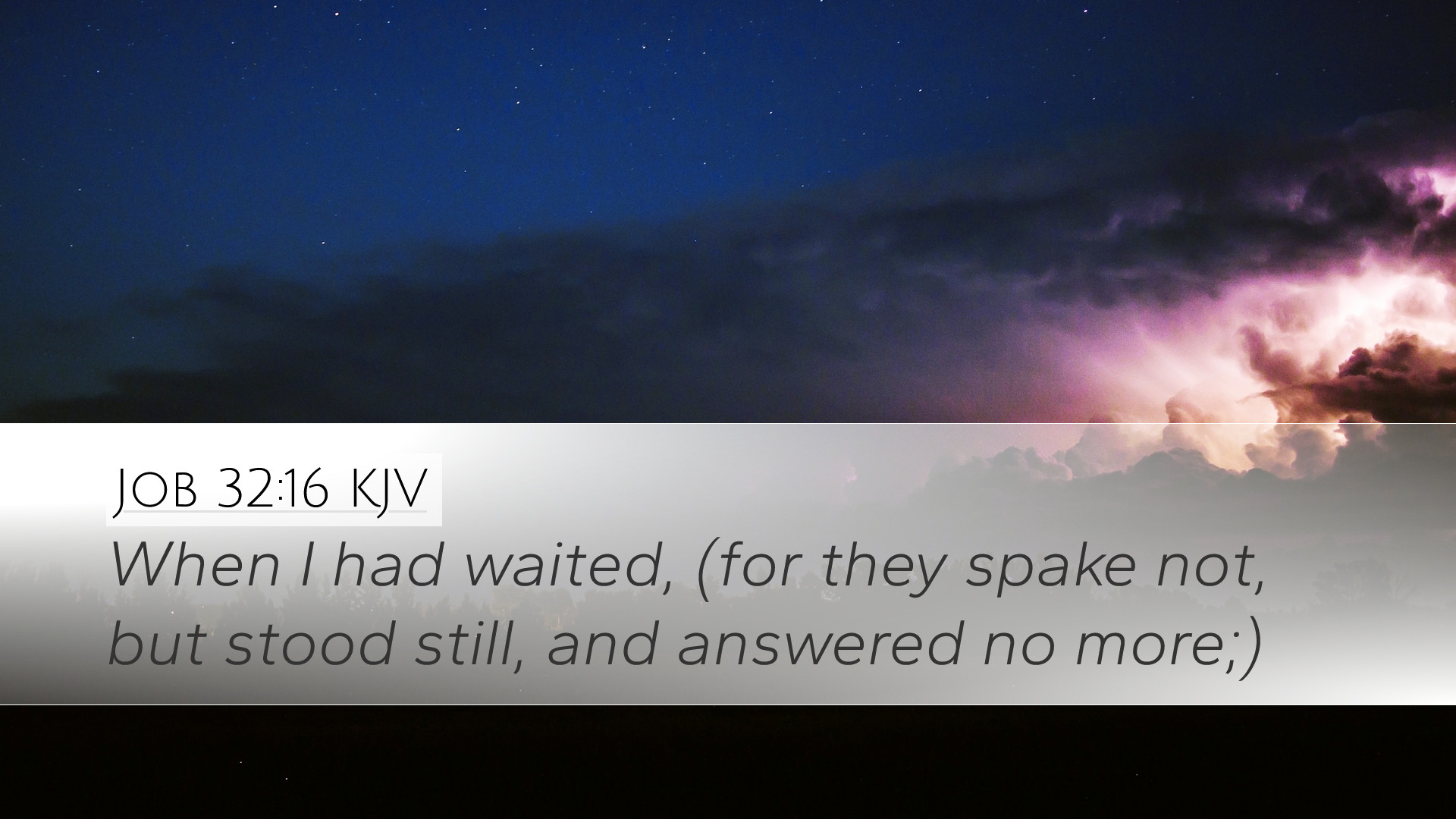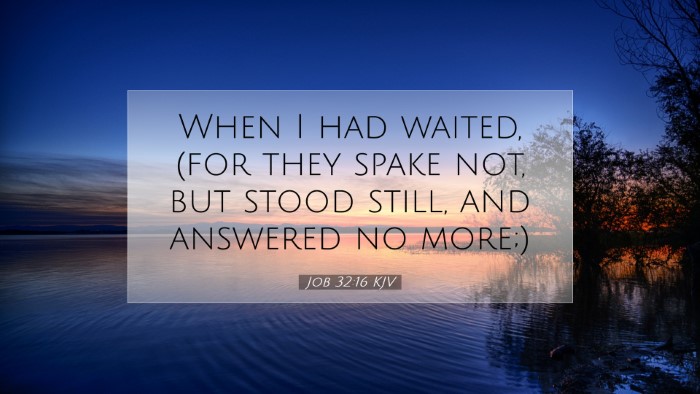Old Testament
Genesis Exodus Leviticus Numbers Deuteronomy Joshua Judges Ruth 1 Samuel 2 Samuel 1 Kings 2 Kings 1 Chronicles 2 Chronicles Ezra Nehemiah Esther Job Psalms Proverbs Ecclesiastes Song of Solomon Isaiah Jeremiah Lamentations Ezekiel Daniel Hosea Joel Amos Obadiah Jonah Micah Nahum Habakkuk Zephaniah Haggai Zechariah MalachiJob 32:16
Job 32:16 KJV
When I had waited, (for they spake not, but stood still, and answered no more;)
Job 32:16 Bible Commentary
Commentary on Job 32:16
Scripture Reference: Job 32:16 - "When I had waited for them, for they spoke not, but stood still and answered no more."
Introduction
The Book of Job presents one of the most profound explorations of human suffering, divine justice, and the quest for understanding amidst life's trials. Job 32 marks a pivotal moment in the dialogues of Job, transitioning from the silence of the three friends to the speech of a fourth character, Elihu. This analysis seeks to provide a thorough understanding of Job 32:16 by utilizing insights from several public domain commentaries, focusing particularly on the perspectives of Matthew Henry, Albert Barnes, and Adam Clarke.
Elihu's Introduction
Elihu's voice arises after the prolonged silence of Job's friends. This silence indicates their recognition of Job's integrity and their inability to satisfactorily answer his profound dilemmas about suffering and righteousness. Elihu, upon witnessing their malaise, feels compelled to speak.
- Matthew Henry: Henry emphasizes that Elihu's position is uniquely significant as he enters the discourse with a youthful perspective, which contrasts with the aged wisdom of Job's friends. Elihu's frustration with their silence reflects the urgency of addressing Job's plight.
- Albert Barnes: Barnes proposes that the silence of the friends illustrates their failure to engage meaningfully with Job’s claims. Their inability to respond aptly allows Elihu the opportunity to step in and articulate what they could not express.
- Adam Clarke: Clarke suggests that Elihu's remarks signal a turning point where a more vigorous defense of God's justice and a more honest approach to human suffering begins to emerge. He sees Elihu as a necessary voice of reason, representing a fresh approach that had been lacking in the earlier dialogues.
The Weight of Silence
In Job 32:16, Elihu expresses his frustration toward the silence of the three friends. This indicates not only their passive stance but also a critical moment of reflection for those engaged in theological discussion.
- Theological Implications: The weight of silence among Job’s friends symbolizes the often inadequate human responses to the complexity of divine providence. In theological education, silence can sometimes reflect a lack of understanding or confidence to address difficult questions.
- Moral Responsibility: Elihu's words remind scholars and theologians of the importance of spiritual accountability. When faced with injustice or suffering, the moral imperative to speak and offer support is crucial.
Elihu’s Resolve
Elihu waits, observing the conversations and contemplative silence, indicating a respect for the gravity of the situation. His eventual decision to speak reveals an important theme of standing courageously to articulate truth when necessary.
- Matthew Henry: Henry highlights Elihu's patience, suggesting that his waiting demonstrates an understanding that speaks to the proper timing in giving counsel. This patience is a quality that pastors and leaders should embody.
- Albert Barnes: Barnes notes that Elihu’s challenge is not merely to add words but to provide meaningful answers that push the discussion toward a deeper understanding of God's nature and human suffering.
- Adam Clarke: Clarke perceives Elihu’s urgent call as an illustration of divine inspiration—an indication that true wisdom often arises in the most unexpected circumstances. This is a potent reminder for scholars that inspiration can come from those they might overlook.
Theological Reflection
Job 32:16 serves as a call to action for theologians and scholars who engage with existential questions about faith, suffering, and divine justice. Elihu's insight compels the reader to consider how they confront and articulate these profound truths.
- Pastoral Application: For pastors, this verse invites self-examination on how best to guide congregants through their suffering. The call is to engage sincerely rather than retreating into silence.
- Scholarly Engagement: Theologically, this passage urges scholars to address the silence on difficult topics within the church. The role of academic discourse is to foster a space where challenging questions can be explored openly.
- Practical Wisdom: The broader implications call for practical wisdom in the church. Silence can often signify confusion or misunderstanding; therefore, clergy must strive for informed, compassionate dialogue that fosters growth.
Conclusion
Job 32:16 is more than a simple transition to a new speaker; it encapsulates the challenges of communication in the face of suffering, the moral obligation to respond, and the faithfulness required in speaking truth. Elihu’s emergence signifies hope for deeper understanding and reconciliation with divine justice and human pain.
This commentary reflects a synthesis of thoughts that not only informs but also transforms how theologians, pastors, and students approach the complex realities of faith and suffering. In a world where silence can often reign, Elihu's example beckons a call for clarity, engagement, and courage in the face of life’s hardest truths.


